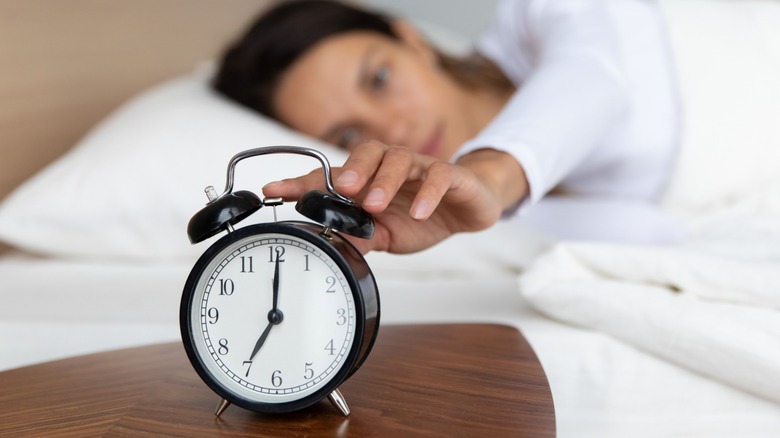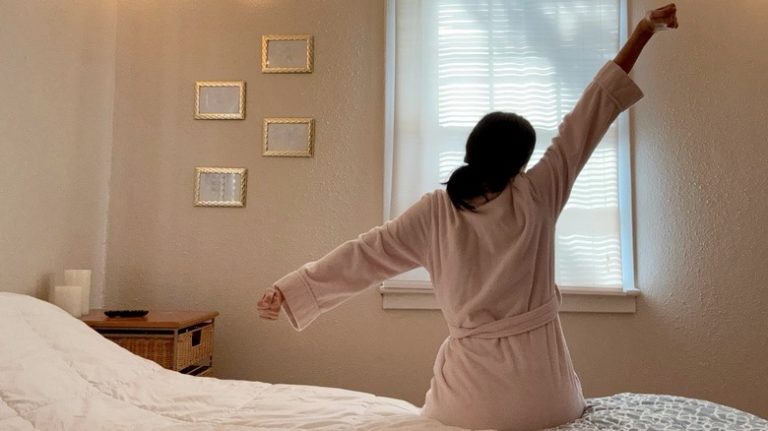If you’re in the habit of hitting the snooze button and willing yourself out of bed most mornings, it could be a sign that you’re not getting a good night’s sleep. Yet, if that sounds like you, you’re not alone. An estimated 50 to 70 million Americans experience continuous sleep disorders, according to the experts at Sleep Foundation.
Dr. Maiken Nedergaard, who studies sleep at the University of Rochester, tells the National Institutes of Health (NIH) that a good night’s sleep is vital for brain health. Besides allowing time for your brain to remember and create, experts believe your brain may also be performing some self-repair during sleep by removing harmful toxins that can cause Alzheimer’s disease. The NIH also reports that we require a good night’s rest to improve the quality of our mood and general health. Additionally, those who sleep poorly on a consistent basis put themselves at greater risk of heart disease, strokes, obesity, dementia, and other medical conditions. Sleep disorders such as insomnia, restless leg syndrome, sleep apnea, and disruptive conditions such as irritable bowel syndrome, heartburn, seasonal affective disorder, and depression can all have an impact on sleep quality, per Sleep Foundation.
However, the good news is that there are numerous options you can implement to set yourself up for success for a night of quality sleep, so when that alarm goes off, rather than hitting the snooze button, you’ll be ready to hop out of bed and hit the shower.
Exercise more

Working out regularly not only keeps your body in shape, but it can also help improve your sleep, according to experts. However, they note that the timing of when you exercise is essential.
Though experts are not entirely sure as to the relationship between exercise and sleep and why exercise can sometimes have an impact on sleep quality, Charlene Gamaldo, M.D., medical director of Johns Hopkins Center for Sleep at Howard County General Hospital, tells Johns Hopkins Medicine that evidence based on studies suggests that exercise not only helps you fall asleep faster and more easily but also improves how well you sleep. However, Dr. Gamaldo adds that people should listen to their bodies as to the best time of day when exercise positively affects sleep quality. For instance, some people report experiencing poor sleep if they engage in an evening workout too close to bedtime. Aerobic activities release endorphins, which are chemicals that reduce pain and promote pleasure but can also keep some people awake. These people should exercise a good one or two hours before going to sleep to give the brain a chance to wind down, Dr. Gamaldo says.
Healthline reports that 30 minutes of moderate-intensity exercise may also improve sleep by enhancing the deepest, most restful phase of sleep, also known as non-REM sleep. Additionally, exercise may reduce sleepiness during the day, promote your need to sleep (which can help you fall asleep easier), and reduce some symptoms associated with sleep disorders.
Improve your diet

If your daily diet consists of unhealthy foods or late, heavy dinners, this routine may be affecting your sleep quality. It probably comes as no surprise, but the experts at the National Sleep Foundation (NSF) report that eating a healthy diet, especially at night, is likely going to have a positive impact on your sleep patterns.
For instance, you are more likely to experience poor sleep if you consume foods low in fiber and high in fat or protein, especially right before bedtime. Since your digestion slows at night, you may feel full and uncomfortable, which can lead to sleep disruption. And unless you enjoy a bout of heartburn, you should also avoid eating spicy foods at night, especially if you have obstructive sleep apnea, since the acid from the heartburn can lead to additional discomfort in your airway. Also, avoid caffeine too close to bedtime since it is a stimulant, per NSF.
Instead, stick to the kinds of fresh foods that make up the Mediterranean diet, many of which contain the chemical serotonin, the hormone melatonin, and vitamin D, all of which may contribute to promoting high-quality sleep (per Harvard Health Publishing). For instance, a healthy dinner consisting of salmon topped with sesame seeds along with a side of dark leafy greens could be just the ticket to send you off on a blissful trip to la-la land.
Avoid alcohol, especially before bed

Solstock/Getty
Many of us enjoy a glass or two of wine when dinng night out or with a meal at home. However, experts say that having too much alcohol, especially right before you go to bed, can lead to a poor night’s rest.
One reason is because of the sequence of deeper and lighter sleep you experience every night, also known as your sleep architecture. Drinking alcohol can disrupt typical sleep patterns, causing you to wake up throughout the night and bounce back and forth between normal sleep stages. Dr. Jennifer Martin, a psychologist and professor of medicine at the University of California, Los Angeles tells the New York Times that alcohol causes sleep disruption because, while it is initially a sedative, alcohol can become activating as your body metabolizes it. Additionally, consuming alcohol will usually prompt you to go to the bathroom throughout the night, because it is a diuretic (a substance that causes increased urine passage).
Another way alcohol can impact your sleep quality is by worsening sleep-related breathing symptoms associated with snoring and obstructive sleep apnea. Because alcohol is a muscle relaxant, the experts at Sleep Doctor report that it can impact your upper airway, by causing the soft tissue to collapse and block the passage of air. In mild cases, snoring sounds can become more profound. In more serious instances, people can experience intermittent lapses in breathing.
Since alcohol tends to mess with sleep in numerous ways, experts advise ceasing consumption four hours before bedtime, per New York Times.
Try mindfulness techniques
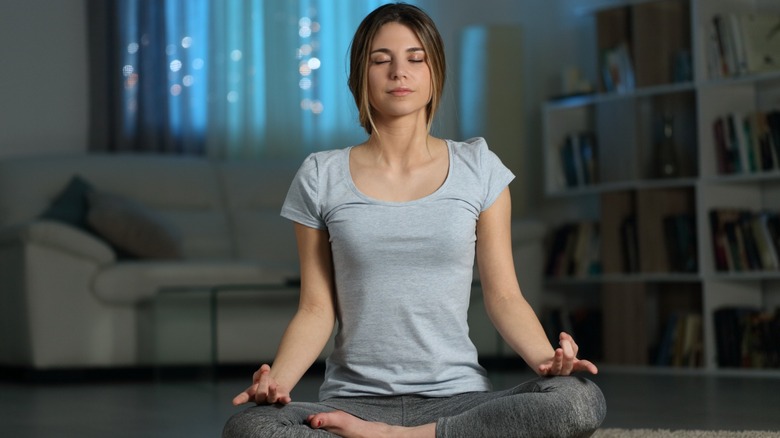
Antonio Guillem/Shutterstock
With active days often come active minds, worry, and stress. Going to bed at night while thoughts are flying through your head is not the best way to begin a night’s sleep.
Mindfulness has become a big buzzword in recent years. Fundamentally, it is about permitting yourself to focus on awareness without judgment. For instance, if you become aware that you’re stressed out, that is a basic observation. From this position, you can make grounded, thoughtful choices. However, if you notice you’re stressed and think it means there’s something wrong with you, that’s a false and demoralizing judgment. Mindfulness is about “pressing the pause button” between an event and your reaction to it. The mindful pause is where you can make conscious choices. It’s the space where the potential for growth lives, per Forbes Health.
Mindfulness meditation is a useful tool as you prepare yourself for sleep, especially when your mind is on autopilot. The experts at WebMD explain that mindfulness meditation is an excellent technique to help you doze off into blissful sleep. It’s a simple process that only requires two steps. First, invite a sense of calm through a series of slow, deep breaths or by repeating a positive affirmation silently or aloud. Emitting elongated “om” sounds can also produce tranquility. Then, relax. If thoughts come (and they probably will), simply notice them, but don’t cling. Let them move along like passing clouds. Don’t judge yourself if your mind wanders. Stay calm and accept this as a natural part of the process.
To nap or not to nap – that is the question

Peopleimages/Getty
If you’re a daytime napper, you’re in good company. In most instances, napping during the day is a refreshing and recharging experience, so it’s no wonder that one-third of American adults get in a nap every day, according to the experts at National Sleep Foundation. But is catching some z’s during the day helpful for getting quality nighttime sleep?
Researchers and scientists report that between 20 and 30 minutes is the optimal length for a nap and that people should nap before 2 p.m. to prevent the nap from having an impact on nighttime sleep. However, napping can become an issue in certain circumstances and for certain people. For instance, if you are already having difficulty sleeping at night or experiencing insomnia, the team at Mayo Clinic explains that napping can exacerbate these issues. In some cases, napping may not be ideal for older people, as it can sometimes be associated with waking up throughout the night.
Additionally, though health experts generally support short naps, evidence indicates that longer naps can be detrimental to your health. For example, results of a study in China showed that middle-aged and older women who napped for 90 minutes were more at risk for high blood pressure (via Heart & Lung: The Journal of Critical Care). In a different Chinese study, results showed a higher frequency of non-alcoholic fatty liver disease among people who took naps for more than 30 minutes (via Plos One).
Optimize your mental health

antoniodiaz/Shutterstock
If you’ve implemented improvements in your life to level up your sleep quality but still experience insomnia, it may be time to look at your mental health. You may be caught in a cycle involving poor sleep combined with depression or anxiety.
Experts at Johns Hopkins Medicine explain that there is a close link between depression and sleep. Some 75% of individuals who report having depression also have trouble falling and staying asleep. Poor sleep could increase your vulnerability to the kind of difficult emotions that lead to depression, Johns Hopkins sleep researcher Patrick H. Finan, Ph.D. says. Conversely, depression could also be the starting point that leads to poor sleep quality. Those who experience insomnia could be 10 times more likely to develop depression, and so the cycle is bi-directional. Consequently, you should take sleep problems seriously and consult a doctor sooner rather than later if falling or staying asleep is a consistent problem, you experience tiredness throughout the day, or if you have any physical or medical conditions that prevent you from getting a restorative night’s rest.
To support your mental well-being as you prepare for bed, the mental health team at Novum Psychiatry advises avoiding caffeine and engaging in a brief meditation to help set you up for success. If anxiety or depression symptoms persist and impact sleep, they suggest asking your mental health provider if cognitive behavioral therapy or medication can help your situation.
If you or someone you know needs help with mental health, please contact the Crisis Text Line by texting HOME to 741741, call the National Alliance on Mental Illness helpline at 1-800-950-NAMI (6264), or visit the National Institute of Mental Health website.
Address sleep disorders

YURII MASLAK/Shutterstock
Also known as sleep-wake disorders, sleep disorders often occur in association with other medical conditions or mental health issues and impact the quality, quantity, and timing of sleep, leading to impaired functioning and agitation during the daytime.
Insomnia is the most common type of sleep disorder, with roughly one-third of Americans reporting that they have experienced some insomnia symptoms. Common sleep disorders include sleep apnea, narcolepsy, restless leg syndrome, and parasomnias such as sleepwalking, nightmares, and nighttime seizures, per the American Psychiatric Association. If your sleep is disrupted three nights a week for three months or more and impacts your ability to function at work and overall quality of life, this is a sign of insomnia, and it may be worth seeking medical evaluation to confirm a diagnosis and get advice for the appropriate treatment for your situation.
To determine if you have insomnia, your doctor may approach your case in a few ways, such as conducting a physical exam and blood tests to see if there are any underlying medical conditions and providing a questionnaire to get an overview of your sleep habits, according to the experts at Mayo Clinic. Treatments may include cognitive behavioral therapy, over-the-counter sleep aids, or prescription medications. In some cases, your doctor may recommend that you take part in a sleep study by staying overnight at a sleep center if your test results are unclear.
Review your medications and when you take them

Moyo Studio/Getty
If you take medication, there may be side effects that cause your sleep issues. Though certain medications have side effects that can cause drowsiness in certain people, the pharmacist team at Express Scripts explains that the opposite is also true, with certain types of medication sometimes causing a feeling of restlessness. For instance, if you use an asthma inhaler, there is a chance that the medication can cause anxiety, restlessness, or jitters in some people enough to impact sleep quality. Common cold medications can also have the same effect.
Beta-blockers, a class of medicines that impact cell activity and are prescribed to people who require treatment for their heart, circulatory system, nervous system, and other bodily functions, may lower your body’s melatonin levels and consequently induce nightmares that cause you to awaken. Additionally, medications containing caffeine, such as weight-loss pills, can keep you awake. If you are trying to stop smoking using aids containing nicotine, these products can also cause sleep issues.
For individuals with type 2 diabetes taking the medication metformin to help control the glucose in their blood, the American Association of Retired Persons reports that some may experience sleep disturbances. Also, some individuals with dementia who take “wake-promoting” medication to boost alertness may have sleep issues.
To improve these or any other types of situations, it’s best to talk to your doctor about lowering the dosage or applying different approaches to help reduce sleep disruption.
Build a better wind-down routine
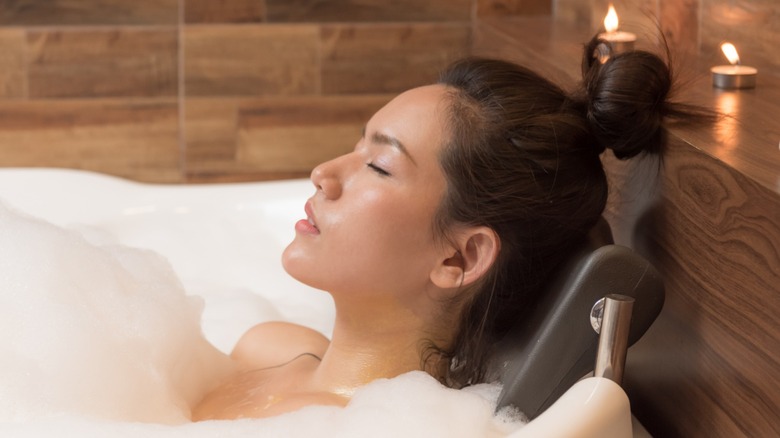
narikan/Shutterstock
Getting a better night’s rest means taking the time to allow your body and mind to wind down before going to bed. The experts at Sleep Foundation explain that your brain likes habits, and replacing bad ones with good ones on a consistent basis can play a big role in reducing stress and anxiety. Worrisome thoughts left unchecked can increase the risk of developing depression, which is why sticking to a consistent bedtime routine is vital for your health.
In general, all bedtime routines involve a series of steps that you schedule for the same time every night roughly an hour before bed that helps you relax and de-stress, according to the experts at Somnus Therapy. In addition to practicing meditation or mindfulness, other examples of relaxing wind-down practices before bedtime include reading, journaling, taking a warm bath, and turning on some soothing music. Additionally, having a light snack, such as fruit or oatmeal, can also support better sleep, as sleeping on an empty stomach can be disruptive. Incorporating a wind-down routine can also potentially deliver a host of other benefits beyond a better night’s sleep, such as supporting a healthy weight, sharpening thinking, boosting your mood, improving your immune system, and reducing the risk of health issues.
Bedtime routines are as important during childhood as they are during adulthood. Children who establish a reading habit before bed set themselves up to promote good sleep in adulthood. Just keep the plots simple and uneventful to avoid exciting the mind, per Sleep Foundation.
Put away the screens

fizkes/Shutterstock
Our smartphones and tablets have turned into extra limbs for many of us. However, most experts believe that gluing your eyeballs to screens too close to bedtime is a big no-no.
A major downside of screens is due to the light they produce. Joanna Cooper, M.D., a neurologist and sleep medicine specialist with the Sutter East Bay Medical Foundation, tells Sutter Health that the light from the screens stimulates the part of the brain that tells us to stay awake. She explains that the pineal gland in the brain promotes sleep through the secretion of the hormone melatonin as daylight dims into the evening. The blue light that emanates from screens is particularly disruptive. Blue is the color associated with the most active part of our sleep cycle, suppressing melatonin and making it challenging to turn off our brains and fall asleep.
Moreover, evening texting, television watching, or playing video games are stimulating and keep the brain wound up, potentially leading to adrenaline rushes when you should be establishing a sense of calm. So put screens away at least an hour before bedtime. Additionally, the experts at Raising Children Network advise parents to encourage children to meet with friends in person during the day instead of over screens in the evening and to engage in physical activity to make them more tired at night. Lastly, keeping devices in a different room overnight will help promote better sleep hygiene.
Improve your sleep environment
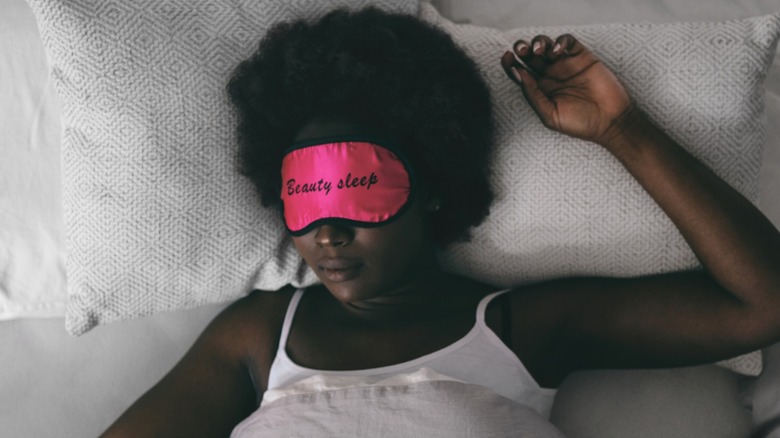
Aja Koska/Getty
An optimal sleep environment is essential for a good night’s sleep. The good news is that there are simple steps you can take to improve your space to set yourself up for sleep success.
Perhaps unsurprisingly, the Centers for Disease Control and Prevention (CDC) states that the optimal sleep environment should be dark, cool, quiet, and comfortable. Even so, it may take some forethought to prepare your bedroom to meet some or all of these components. For one, making your sleeping space dark may necessitate more than just closing the blinds. If you live in an area with bright street lights or other bright outdoor light sources, this may require room-darkening shades or heavy draperies to block the light from entering your space. If you are unable to sufficiently block out all light, wearing a sleep mask could be a simple remedy.
Maintaining a proper room temperature is also key to promoting better sleep. The team at Relax The Back advises setting your thermostat between 65 and 72 degrees Fahrenheit, which keeps your body comfortably cool. When your body overheats during the night, this could induce wakefulness. If you tend to get warm at night, wear light pajamas and make sure your linens are made of natural, breathable fabric such as cotton or linen. Additionally, keep the room well ventilated. Opening a window or setting a fan at a low speed can help you awaken refreshed and ready to take on the day.

